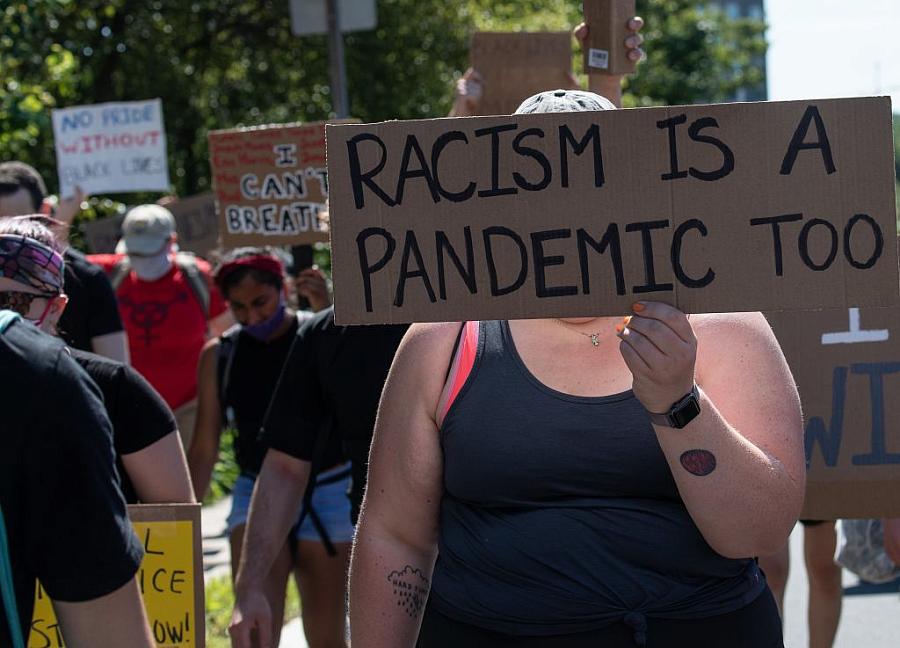Racism is making Black people sick

“We’re trying to give folks and ourselves the stories we wish we had heard,” said journalist Gabrielle Horton, host of NATAL, a podcast focusing on Black birthing experiences.
(Photo by Nicholas Kamm/AFP via Getty Images)
As she sat inside a Southern California emergency room, 34-year-old Myesha cried in pain. Her headache had worsened. She could not explain what was happening to her.
“In that moment, not only am I in pain, but I'm separated from my newborn, I'm alone, and I still have to process: what is this young white doctor gonna think of me as a Black woman in the emergency room, right?” Myesha recalled in an interview for NATAL, a podcast that focuses on Black birthing experiences.
“Am I going to be perceived as not being in as much pain as I'm saying I am?”
Myesha suffered a seizure inside the emergency department that day in 2018. Neither the attending nurse nor physician had looked at her blood pressure, she said. Nor had they taken the time to learn that when she was pregnant, she developed preeclampsia, a complication characterized by high blood pressure that persisted after she gave birth.
Though fine now, Myesha’s experience is what NATAL’s host and co-creator, Gabrielle Horton, says is all too common, based on one reason:
Being a patient while Black.
“I don’t know if it’s so much about discrimination as it is about racism built in the system,” Horton told journalists attending the 2021 California Fellowship via Zoom this week.
She created NATAL to tell stories that highlight how systemic racism and racial bias, conscious or unconscious, can be fatal for Black people, “even when we're bringing life into the world,” Horton added.
The stories on the podcast explore the long history of racism in the medical system, from the time enslaved Black women were used in experiments to the current experiences of Black transgender fathers, gay couples, midwives and immigrants. Horton said she also shares stories of parents who have beautiful birthing experiences.
“We’re thinking about how to tell the stories that represent Blackness in its totality,” Horton said. “We’re trying to give folks and ourselves the stories we wish we had heard.”
Horton said discrimination comes in many forms.
“It’s not the lynch mob in Georgia,” she said. “We’re experiencing this tension, these negative interactions without visuals... small experiences where you are constantly being dismissed.”
The stress of racism and distrust of the medical community has come into more focus during the pandemic. In Los Angeles County, public health officials reported this week that Black and Latinx men have the highest death rates from COVID-19 compared to all other groups, but the lowest rates of vaccination.
Black, American Indian, and Alaska Native women are two to three times more likely to die from pregnancy-related causes than white women. The disparity increases with age, according to a 2019 report from the Centers for Disease Control and Prevention. Most pregnancy-related deaths are preventable, researchers noted.
Cheryl Woods Giscombé, a professor at the University of North Carolina at Chapel Hill, told the journalists at the California Fellowship that her own experiences spurred her to study stress-related health disparities among African Americans. As a doctoral candidate in New York, she felt stressed and sought counseling. In her first session, she explained that her faith has always been important to her. The counselor then asked her: Why do Black women always say that?
"It wasn’t a curiosity question — it was like, why? I immediately felt disconnected and couldn’t go further with this person,” Giscombé recalled.
But it was another experience that showed the blunt reality of racism. When her grandmother became ill and started vomiting blood, Giscombé took her to a nearby urgent care. The physician told them it was too late in the day to conduct tests, and that the older woman, a nurse familiar with healthy practices, should stop eating fried chicken and go to a pharmacy and buy antacids. Giscombé and her grandmother went to a different health care facility next where a doctor soon discovered that her symptoms had been caused by metastatic cancer.
That left Giscombé to wonder: How many people did the first doctor turn away? “How many walked into that urgent care and trusted that provider?”
People don’t suffer illnesses because they are Black, she and Horton emphasized. Racism causes stress that can lead to illnesses.
Giscombé said research shows how stress influences physiology and can exacerbate chronic illnesses. Besides distrust, there are many reasons why Black people may not seek treatment for illnesses sooner — lack of health care in the area where they live, facilities that have few if any providers of color who can relate to their experiences, and the stigma of seeking specialized care such as mental health services.
"Those are things that providers need to understand,” Giscombé said. “Those are reasons why people make the decisions they make. It’s not because they are lazy or don’t care.”
She said her work includes raising awareness about the stress of racism not only among physicians, nurses, and health care associations, but also in medical and nursing schools.
"Unless it’s addressed in the curriculum, (students) may not even think of it as an issue” Giscombé said.
Update: The paragraph detailing the health care experience of Cheryl Woods Giscombé’s grandmother has been further edited for clarity.

